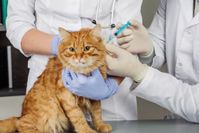
Vaccines are an important part of making sure your pet doesn’t develop dangerous, preventable diseases. However, many owners are concerned about over-vaccinating their pets, especially when they live indoors. But depending on a variety of individual factors, including your pet’s habits, health, and geological location, vaccinations might be necessary. Read on to learn some common concerns about vaccines, as well as the reasons your veterinarian may recommend them regardless.
Why Some Hold off on Vaccines
Like any medication, there are inherent risks involved in vaccinations. A small subset of cats may exhibit allergic reactions, but most of them are mild. Severe reactions are uncommon and cause wheezing, vomiting, diarrhea, and collapse. Contact your veterinarian if these symptoms appear. If swelling near the site persists for multiple weeks, an extremely rare form of cancer known as feline injection site sarcoma (FISS) may be developing. Head to the veterinarian immediately, as treatment will require the removal of the tumor.
 Beyond the possible health hazards, many indoor cat owners feel that vaccinations, such as rabies, feline herpesvirus, and feline parvovirus are unnecessary. These harmful diseases are generally spread from contact with infected animals, so indoor cats are certainly at less of a risk than other pets. However, there are also dangers involved with allowing your cat to go vaccine-free.
Beyond the possible health hazards, many indoor cat owners feel that vaccinations, such as rabies, feline herpesvirus, and feline parvovirus are unnecessary. These harmful diseases are generally spread from contact with infected animals, so indoor cats are certainly at less of a risk than other pets. However, there are also dangers involved with allowing your cat to go vaccine-free.
The Case for Vaccinations
Despite the potential complications of vaccinations, long-term issues are not common and will not affect the average healthy cat. Unvaccinated cats, however, are at risk whether they are indoor ones or not. If your cat manages to slip out the door or window, they could run into an infected stray or wild animal. All it takes is one bite to spread rabies, one of the deadliest diseases animals can contract. Feces, urine, blood, saliva, and even fleas from an infected cat can also spread disease. Feline calicivirus is so highly contagious that a sneeze from an infected cat several meters away will give your cat the virus.
Even if your cat does not escape the house, fleas are notorious for finding their way into homes and spreading. These resilient insects carry many diseases, including feline parvovirus, which sometimes develops into feline distemper. Indoor cats are safer than outdoor ones, but these preventable diseases can still reach them from inside your home.
The benefits of vaccinations greatly outweigh the risks, but your cat may not need them as often as generally recommended. When it comes to giving your cat vaccinations, your best bet is to discuss the pros and cons with your veterinarian. The animal care professionals at Dells Animal Hospital of Wisconsin Dells understand that you only want the best for your cat, so they’ll work with you to create a vaccination schedule that will benefit your pet’s needs. With state-of-the-art technology, advanced medical practices, and pet care specified to your furry friend, their veterinary services are unrivaled. To learn more, call (608) 253-7361 today or visit their website.
About the Business
Have a question? Ask the experts!
Send your question

